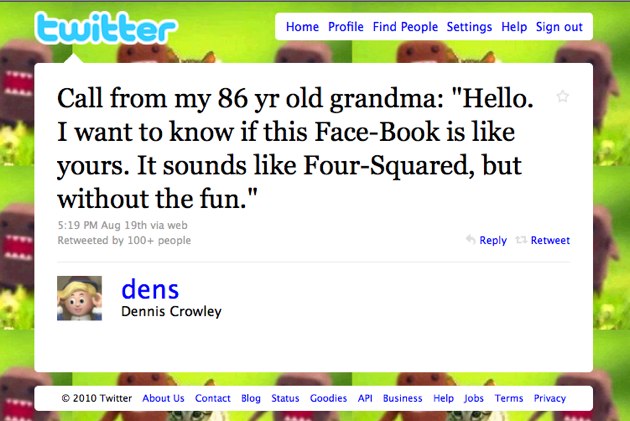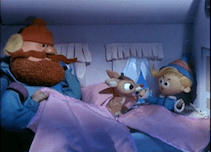Foursquare may have a tenuous partnership with Facebook Places— but don’t let the Kumbaya presentation fool you, these frenemies are gunning for the ultimate mayorship and Dennis Crowley is feeling very confident.
On Friday’s taping of Gillmor Gang with former TechCrunchIT Editor Steve Gillmor, Kevin Marks and John Taschek, Crowley discussed the opportunity for places, outlined his plan for the next iteration of Foursquare and knocked Google for its social awkwardness. While his disgust with Google’s mismanagement of the ill-fated Dodgeball is well documented, in his explanation you don’t need to read between the lines to understand he’s also talking about Facebook and how he plans to beat Goliath.
“It’s difficult to build services that are supposed to scale to you know 30, 50, 100 million users right off the bat, because they got to be kind of tailored down, by definition they have to be a little bit generic to speak to that large of an audience. And one of the benefits that we get from starting from scratch and starting as a mobile, social, local startup is that we start with zero users and we can put whatever personality and whatever face we want to on the product… Part of what you see on Foursquare, which is the game mechanics and the snarkiness and really more importantly like the fun and the playfulness that we build into the product, because I think that’s the stuff that most people relate to. And you can poo-poo how like those touchy-feely things don’t mean too much to users but I really think that’s the core and kind of the soul of the service and people identify with that.”
Still not convinced that Crowley’s painting the picture of Facebook as a generic-borderline-boring service, versus Foursquare, the hip, edgy, playful alternative? Let’s step back and consider recent evidence. Earlier this week, Crowley blasted a seemingly harmless tweet: “Call from my 86 yr old grandma: ‘Hello. I want to know if this Face-Book is like yours. It sounds like Four-Squared, but without the fun.'”

In a word, that’s what Crowley has brought to this undercover dogfight: fun.
Although it may sound silly, Crowley’s argument is logically sound. The core of “fun” is his most potent weapon to staying relevant.
Facebook is so huge (500 million large versus Foursquare’s 2.8 million) that its check-in service has to be simple and minimal to accommodate such a huge and diverse group— anything too quirky or outlandish runs the risk of alienating factions. While Foursquare cannot dream to compete with Facebook’s installed base, the startup can certainly differentiate itself by offering a creative, more dynamic product that is less utilitarian and more personality-driven.
As Crowley explains on the Gillmor gang show, he does believe that Facebook has a major role to play in the location ecosystem. Facebook can aggregate check-ins from different services and introduce new users (millions upon millions of them) to the world of check-ins. Thus, if Facebook stays in its corner, the relationship could be a very symbiotic one for Foursquare, which saw a record number of sign-ups on Thursday.
In the meantime, Foursquare is certainly not content to just wait and watch this play out. The rapidly expanding team is working hard to push out the new version within the next two weeks. Crowley, who says he’s “embarrassed” by Foursquare’s current game mechanics, says the next iterations of Foursquare will focus on “reworking and rethinking…the way the tips and the to-dos work, because that’s going to be core of the system.”
In other words, when it comes to the basic check-in, Facebook can be the king of the hill, but when it comes to creating the most engaging, valuable location experience, Crowley is ready for a fight.
Below are highlights from the Gillmor Gang show/ or see video above:
On the opportunities with Places
“I think there’s been a lot of folks who’ve tried to do… check-in aggregation services in the past and ultimately I think that’s going to be, that’s probably a good thing for the industry just so it’s not as fragmented…We’ve been looking at their API and playing with it a little bit, there’s a good chance we’re going to push our check-ins into the facebook feed and there’s a good chance we’re going to pull their check-ins out of it. But I think the big win here, just as Twitter and Facebook taught the world how to share things online photos and status updates and social commentary, I think Facebook is going to teach the world what check-ins are all about.”
On the differences between Places/Foursquare
“We don’t ignore the past. I think one of the great things about Foursquare is that we got a critical mass of users that interact with us two or three minutes every day. Like they do three or five check-ins, on a daily basis that’s not a lot of content, not a lot of data that we’re getting…but over the course of weeks and months it ends up being a lot interesting data about the types of places that people go, the types of things they enjoy doing, the types of people they hang out with. You can cut that stuff up and recycle it back to the users in…lots of interesting ways and I think that’s going to be a big opportunity for us.”
On the problem with Foursquare’s game mechanics
“I think the game mechanics, they really need a lot of work. They really need a lot of improvement, there’s a lot of stuff in the product that we’re not happy about, there’s a lot of stuff I’m kind of like embarrassed about, there’s a lot of things that we need to fix. And people love it as it is. Another big push that you’re going to see from us in the next couple of months is redefining and redeveloping a lot of these game mechanics. Just because we’ve gotten much smarter about it. And I think once we start applying a lot of the stuff we’ve learned to the stuff we’ve already built, then we’ll really start to blow people away.”
The next iteration
“The next version of the Foursquare app comes out in probably like two weeks or so and we’re really reworking and rethinking like the way the tips and the to-dos work, because that’s going to be core of the system. …We’ve been thinking for awhile, what’s act two for us? And act two is OK let’s take all this information about what people are doing, what people want to do, and let’s build this back into the app in a way that’s manageable for people and easy to share.”
On Google’s location/social strategy
“I think they’ve just always struggled with social. That could be an entire different, an hour long conversation over what is it with social that they don’t get… My belief has always been that in order for services to take off in the near term, in order for them to develop that passionate user base of people that go out and turn into advocates. The services need to have some kind of personality to them and some kind of identity to them and I think it’s really difficult and I felt like we ran into some of this when we were at Google. It’s difficult to build services that are supposed to scale to you know 30, 50, 100 million users right off the bat, because they got to be kind of tailored down, by definition they have to be a little bit generic to speak to that large of an audience. And one of the benefits that we get from starting from scratch and starting as a mobile, social, local startup is that we start with zero users and we can put whatever personality and whatever face we want to on the product. Part of what you see on Foursquare, which is the game mechanics and the snarkiness and really more importantly like the fun and the playfulness that we build into the product, because I think that’s the stuff that most people relate to. And you can poo-poo how like those touchy-feely things don’t mean too much to users but I really think that’s the core and kind of the soul of the service and people identify with that.”
On why the world needs more than one social graph
Our social graph is more representative of the people that you meet in the real world. I am starting to believe, if you asked me a year ago, Why would you ever need more than one social graph? You need representation of a couple of them. Between the three, Facebook is literally everyone I’ve ever shaken hands with at a conference or kissed on the cheek at Easter. Twitter seems to be everyone I am entertained by or I wish to meet some day. Foursquare seems to be everyone I run into on a regular basis. All three of those social graphs are powerful in their own
Facebook Connect came along and it really made the social graph open to everyone and makes building social apps easier. We think, oh, we are just building our social graphs on top of Facebook . But Facebook could benefit from our social graph, and Facebook could benefit from Twitter’s social graph. You maybe are not just sucking data out of one, and that is the end of it, but maybe sucking data out of one and putting it in another and they are all working to make each other a little more powerful and a little more accurate.
